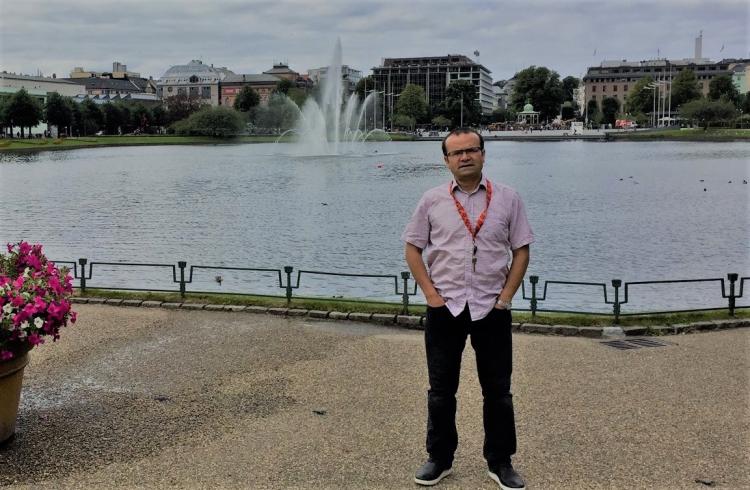When language stands up to a superpower – Bergen welcomes Uyghur writer Weli Ayup
The City of Bergen welcomed Weli Ayup in July 2019 as its sixth ICORN writer-in-residence. - I am grateful to be in Bergen, where I can continue my work coordinating Uyghur education for children and families in exile, says Weli Ayup.
As an active promoter of Uyghur language and culture, Weli Ayup has faced repeated harassment in his native home - the Xinjiang Uyghur Autonomous Region (XUAR). Chinese authorities have directed a hard-line approach towards Turkic speaking minorities living in Xinjiang, especially the Uyghurs, who make up the largest part of the minority population in the region. The authorities repress the Uyghur-speaking people’s linguistic rights to use their language and to practice their culture by enforcing a policy of using Mandarin as the primary language of instruction in schools and public life. The persecution of writers, journalists and other intellectuals who speak out against the oppression, occurs frequently.
According to the Chinese Constitution, Ayup says, Uyghurs have the right to education in Uyghur language and a right to practice their cultural traditions. But this right has been slowly and thoroughly suppressed the past many years. Ayup, who has become an important spokesman for the Uyghur’s right to education in their mother tongue in Xinjiang, has witnessed the development and experienced the repercussions first hand.
- I was taught in my mother language Uyghur when I grew up. But from 2001, this right has in practice been taken away from our people, with harsh measures, says Weli Ayup.
Chinese authorities are accused of justifying their systematic suppression of peaceful political and cultural expressions in the region by fabricating and exaggerating terrorist threats from minorities. Uyghurs are exposed to systematic surveillance, political indoctrination and assimilation measures. Human rights organisations, like Amnesty International and Human Rights Watch, have estimated that up to a million ethnic minority groups are detained in what the Chinese authorities describe as re-education camps. The Uyghurs themselves refer to them as concentration camps.
Before fleeing to Turkey in 2015, Ayup spent a year in one of these camps. He was detained for over a year, without trial, for setting up schools and kindergartens to promote Uyghur language in the XUAR.
See Al Jazeera’s interview with Weli Ayup January 2019 about the internation camps: Uighurs: Nowhere To Call Home
Weli Ayup - Linguist and writer
Weli Ayup holds a BA in Uyghur Literature and Language from Minzu University, Beijing, as well as an MA in Ancient Uyghur Literature from Xinjian University, and a Masters degree in Linguistics from the University of Kansas, USA. Ayup has worked as a lecturer in linguistics, Chinese literature and language, Uyghur history, culture, literature and language at both the University of Xinjiang and Northwest University for Nationalities, and has served as a visiting scholar in Ankara University’s Department of Turkic Languages and Literature.
His academic articles have been published in several Uyghur-language journals, including Language and Translation, Tarim, Miras, Journal of the Central University for Nationalities. Ayup has written hundreds of articles and poems and has since early 2010 become a popular web-writers among Uyghurs following the publication of his articles and essays on Uyghur language websites in Xinjiang.
Ayup is a member of PEN International’s Uyghur PEN Centre and the Uyghur Academy, a civil society organisation based in Istanbul. He has published four books online, including Let’s Learn Our Mother Tongue (2017), On the Way of Parenting (2015), Stateless thoughts in the US (2011) and My Daughter’s America (2013).
In addition to the Turkic language Uyghur, Ayup speaks fluent Turkish, Mandarin Chinese and English.
Continuing the work for Uighur's culture and rights
Weli Ayup continued to work in Turkey under difficult circumstances and looks forward to concentrating fully on his work while safely in residency in Bergen.
He says that the Uyghur community has already established 40 Uyghur schools world wide for young Uyghurs living outside of China. In Norway, the organisation Den Norske Uigur Komité (the Norwegian Uyghur Committee), already opened seven schools offering Uyghur education for children on Saturdays, including in Bergen.
Bergen City of Refuge
Bergen joined ICORN on 1 January 2008 and the city welcomed its first guest writer the same day. The city has hosted five writers in ICORN residencies: Ayaz Khonsyawashan, Kurdish poet and journalist from Iran, Hossein Heidary, Kurdish journalist from Iran, Lokeesan Appuththurai, Tamil journalist from Sri Lanka, Kareem Amer, blogger and writer from Egypt and Ratan Samadder, blogger and writer from Bangladesh.
Latest news
-
23.04.24
-
18.04.24
-
04.04.24
-
26.03.24
-
21.03.24







